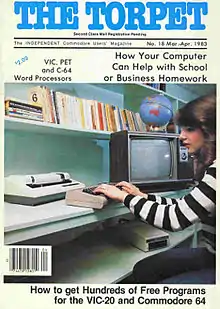The TORPET
The TORPET was a Toronto-based computer magazine directed at users of Commodore's 8-bit home computers.
 Issue 18 (March/April 1983) | |
| Editor | Bruce Beach |
|---|---|
| Frequency | Monthly |
| Publisher | Bruce Beach |
| First issue | November 1980 |
| Final issue | August 1984 |
| Country | Canada |
| Based in | Toronto |
| ISSN | 0821-1809 |
Publication history
Though named for and associated with the Toronto PET Users Group (TPUG),[1] the magazine was published independently of the club as a commercial enterprise with paid writers.[2][3] Twenty-eight issues were produced for TPUG from November 1980 to August 1984.[4]
In 1984 TORPET's owner and editor, Bruce Beach, dissociated the publication from TPUG and relaunched it as an oceanography journal, backronymming its name to Today's Oceanographic Research Program for Education & Training.[2] TPUG launched its own computing journal, TPUG Magazine, in February 1984.[5]
A 320-page anthology of The TORPET's most popular articles, The Best of The TORPET Plus More for the Commodore 64 and the VIC-20, was published in 1984 by Copp Clark Pitman. It featured type-in listings for over a thousand freeware programs, articles and cartoon strips teaching BASIC and machine language programming, memory maps, and user documentation for popular public domain software.[6]
References
- Calloway, James (August 1983). "Should You Join A Users Group?". COMPUTE!'s Gazette. COMPUTE! Publications. 1 (2): 28–32.
- Butterfield, Jim (Fall 1986). "Welcome to the TPUG/Transactor Pages". TPUG News. Toronto PET Users Group. 1 (1). Retrieved 29 December 2014.
- "Torpet Pays $20.00 per Page for Articles" (PDF). The TORPET (14): 3. October 1982. Retrieved 29 December 2014.
- "Archives". Toronto PET Users Group. 2014. Retrieved 6 April 2015.
- "News BRK". The Transactor. Transactor Publishing. 4 (6): 6–13. 1984. Retrieved 29 December 2014.
- Beach, Bruce, ed. (1984). The Best of The TORPET Plus More for the Commodore 64 and the VIC-20. Toronto: Copp Clark Pitman. ISBN 0-7730-4080-3.